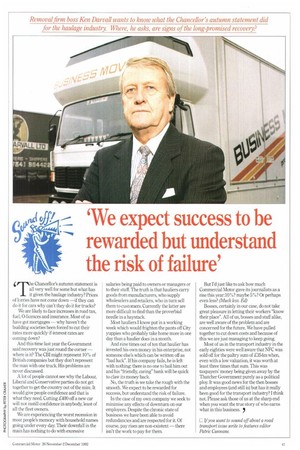act if' 'We expect success to be
Page 43

If you've noticed an error in this article please click here to report it so we can fix it.
rewarded but understand the risk of failure'
4 T he Chancellor's autumn statement is all very well for some but what has
it given the haulage industry? Prices of lorries have not come down —if they can do it for cars why can't they do it for trucks?
We are likely to face increases in road tax, fuel, 0-licences and insurance. Most of us have got mortgages — why haven't the building societies been forced to cut their rates more quickly if interest rates are coming down?
And this time last year the Government said recovery was just round the corner — where is it? The CBI might represent 10% of British companies but they don't represent the man with one truck. His problems are never discussed.
A lot of people cannot see why the Labour, Liberal and Conservative parties do not get together to get the country out of the mire. It would give people confidence and that is what they need. Cutting £400 off a new car will not instill confidence in anybody, least of all the fleet owners.
We are experiencing the worst recession in most people's memory with household names going under every day. Their downfall in the main has nothing to do with excessive salaries being paid to owners or managers or to their staff. The truth is that hauliers carry goods from manufacturers, who supply wholesalers and retailers, who in turn sell them to customers. Currently the latter are more difficult to find than the proverbial needle in a haystack.
Most hauliers I know put in a working week which would frighten the pants off City yuppies who probably take home more in one day than a haulier does in a month.
And nine times out of ten that haulier has invested his own money in his enterprise, not someone else's which can be written off as "bad luck". If his company fails, he is left with nothing: there is no one to bail him out and his "friendly, caring" bank will be quick to claw its money back.
No, the truth is we take the rough with the smooth. We expect to be rewarded for success, but understand the risk of failure.
In the case of my own company we seek to minimise any effects of downturn on our employees. Despite the chronic state of business we have been able to avoid redundancies and are respected for it. Of course, pay rises are non-existent — there isn't the work to pay for them. But I'd just like to ask how much Commercial Motor gave its journalists as a rise this year:10%? maybe 5%? Or perhaps even less? (Much less. Ed) Bosses, certainly in our case, do not take great pleasure in letting their workers "know their place". All of us, bosses and staff alike, are well aware of the problem and are concerned for the future. We have pulled together to cut down costs and because of this we are just managing to keep going.
Most of us in the transport industry in the early eighties were well aware that NFC was sold off for the paltry sum of .£354m when, even with a low valuation, it was worth at least three times that sum. This was taxpayers' money being given away by the Thatcher Government purely as a political ploy. It was good news for the then bosses and employees (and still is) but has it really been good for the transport industry? I think not. Please ask those of us at the sharp end when you want the true story of who earns what in this business.












































































